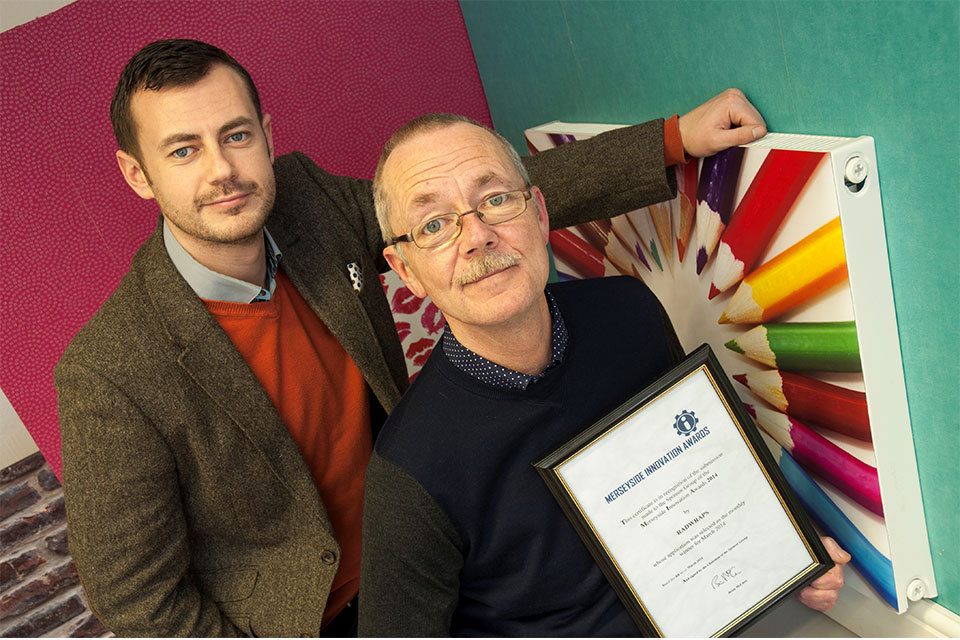Intellectual Property: Radwraps Ltd
Whether you’re doing a spot of decorating or are a professional interior designer, one thing most people agree on is that it’s the personal touches that make a house a home.

Radiator design by Radwraps Ltd
Frustrated that bland, characterless products dominated the radiator market, father and son John and James Maddocks set out to revolutionise the industry. They set out to create a simple to use product that could be customised to compliment any design or décor.
Four years of development later, the Radwrap was born. Easy to fit, the unique radiator cover comes in a variety of sizes and has no heat loss. Best of all, it allows customers to choose their own personalised design.

John and James Maddocks
Image rights
Radwraps Ltd have an online gallery full of images from artists and photographers across the world. Customers can choose to have any of these images printed onto a Radwrap. So how does the business ensure they have the rights to reproduce these images for commercial purposes?
We have around 20 artists and photographers. We have a simple affiliate form that they sign. This allows us to use their images while the copyright remains with them. We then pay them a royalty each time we sell a product featuring their image. If an artist sells the rights to one of their images, we remove it from our site.
In John’s opinion, what benefits does this arrangement bring for the business?
It’s cheaper than buying images for commercial use as they can cost £1000’s per image. It’s also better for us to outsource rather than produce our own images as we can use talented people who have the right skills.
It also has benefits for the artists as they get regular royalty payments from us, but there has to be an element of trust from our artists that we will bill them for the correct amount of images used.
But it’s not only the rights of the professionals that John and the Radwraps team have to consider. As well as choosing from the stock photos on the website, customers can upload their own photographs for printing onto their Radwrap. So how do they manage the copyright in these cases?
99% of the images we receive are photos of customers’ children, pets or holidays. Our website clearly states that customers must own the rights to the images they are providing. Occasionally we’re asked to print an image of One Direction, for example, and have to say no because of copyright regulations.
Copyright management
Image rights can be a difficult area to manage. If a business gets it wrong, there can be serious implications – something which John has first-hand experience of.
In the early days, we bought a disk of 1000 images from a company who said they owned the rights to them all.
We uploaded a selection to our website and before long a high profile photography agency contacted us. They actually owned one of the images and wanted around £1800 for its use.
We received a cease and desist notice and took the image down straight away. As a precaution, we also removed all the other images we’d taken from the disk. We tried contacting the company we had bought it from but, unsurprisingly, the seller didn’t seem to exist any longer.
The possibility of facing a similar situation again is a distressing thought. What advice would John give to businesses using other peoples’ copyrighted images?
You have to be very careful. Make sure you know who owns the rights to the images that you’re using and that you have the correct permissions or licences to do so.
Luckily, the photography company were good with us, but it’s frightening to realise the impact it could have had on the business. Businesses can be taken to court over image rights for £100,000’s. This experience really opened our eyes on copyright.
Licensing
In the same way, businesses can use images of well known characters, sports clubs or TV shows if they buy the correct licences. This can be a great way to boost your business and open up new markets.
Radwraps Ltd has secured licensing agreements with Manchester United Football Club and Liverpool Football Club. These licences allow them to print the clubs’ crests onto Radwraps but, as John found out, obtaining them is far from easy.
We looked at football club merchandise sales and these were the top two clubs on the list. We decided to approach them both with a view to obtaining licensing agreements. But meeting with businesses to present your product to them is one of the hardest things to do.
Eventually, a third party introduced us to Manchester United. We secured a meeting which lasted for 2 hours 30 minutes – it felt like being grilled on Dragons’ Den! At the end of the meeting, they said they were impressed and would love to have our product in their portfolio.
The team then approached Liverpool and found the process was a lot easier because of this newly acquired licence.
Within 35 minutes of meeting with Liverpool, the deal was done. Once you have one agreement in place you get taken more seriously by other businesses and given more credibility. When we’re approaching other business or retailers we now get a much better response.
John believes that having a good system in place for IP management is a must for any business. He feels that it portrays a better image of the business to customers, retailers and business partners.
If artists see us protecting our rights and theirs, they will view us as professionals and want to work with us,” believes John. “Lots of artists have been ripped off and seen their images turn up in places where the producers don’t have the rights to use the images. Having all our IP in place shows we are reputable and that they can trust us.